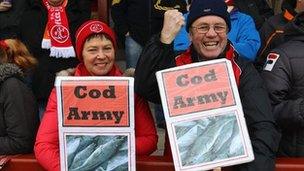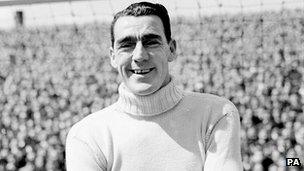Fleetwood Town's stormy voyage to Football League
- Published

Fleetwood's stadium was derelict in the mid 1990s
For many years the fortunes of Fleetwood's football team mirrored the average voyage of the deep sea trawlers that used to sail from the port.
One minute on the crest of a wave, the next navigating turbulent waters.
The club's triumphant promotion to the Football League from the Conference Premier League is a case of third time lucky for the Lancashire side.
This is the third incarnation of the club to play at their Highbury Stadium.
"If you had told me 20-odd years ago we would be in the Football League, I would have said you needed psychiatric help," said club vice-chairman Phil Brown.
Club stalwart Mr Brown was one of a group of local people, led by former chairman Jim Betmead, who started a new club in 1997 after the previous Fleetwood Town collapsed in 1996.
Club's resurrection
The group cleared the tumbleweed from the derelict and vandalised stadium in an effort which saw the resurrected club elected to the North West Counties League as Fleetwood Wanderers but renamed Fleetwood Freeport after a five year sponsorship deal with Fleetwood Freeport PLC.
When that deal expired the club reverted to the name Fleetwood Town in 2002.
The club's transformation began in 2002-3 when local businessman Andy Piley invested heavily, sparking an era of success which saw a new £1m stadium and progress through the non-league pyramid, which culminated with entry into The Football League clinched when closest challenges Wrexham failed to win at the weekend.

Frank Swift played for Fleetwood prior to achieving fame with Manchester City and England
Formed in 1908 the first Fleetwood team played near the North Euston Hotel on the promenade and enjoyed a successful period in the 1920s, winning the Lancashire Combination League once and scooping the league's cup competition three times in the 1930s. Fleetwood moved to the Highbury Stadium in 1934.
Its best known player in the 20s was the future Manchester City and England goalkeeper Frank Swift, who died in the 1958 Munich Air Disaster, by which time he was working as a journalist.
The post-war period saw the club in the doldrums but it was still considered good enough to join the newly-formed Northern Premier League in the mid-60s finishing 10th in its first season.
Socceroo stars
Future Socceroo Adrian Alston, who starred for Australia in 1974 World Cup, played for Fleetwood in this period.
Alston, who was the man legendary West Germany manager Helmut Schoen said he "feared" when the two teams met in that tournament, played alongside another former Fleetwood man turned Socceroo, Peter Ollerton.
"Although we were in the same league as Wigan Athletic, who were eventually elected to the Football League from the Prem, we never had the resources to reach the Football League," said long-standing fan John McKenna.
By 1976 Fleetwood FC had folded and a new club Fleetwood Town was formed, which enjoyed the high spot of reaching the FA Cup First Round for the first time in 1980, only to lose 4-0 to Fylde Coast neighbours Blackpool.
And four years later there was a trip to Wembley when they were defeated 3-1 by Halesowen in the FA Vase Final.
But by 1990-91 Fleetwood had finished fourth in the new Northern Premier Premier Division but by 1996 this club had folded.
Mr Brown wrote a club history in the 1990s called "Through Stormy Waters", the title a reflection of the boom and bust of the club's past.
But he says now: "This is a different era - we are entering the Football League on a much firmer footing."